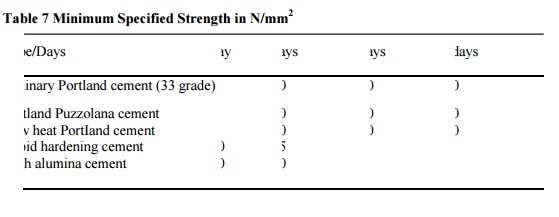Chapter: Civil : Construction Materials: Lime, Cement, Aggregates, Mortar
Compressive Cement Strength
Compressive Cement Strength
Compressive Strength: Compressive
strength is the basic data required for mix design. By this test, the quality
and the quantity of concrete can be cotrolled and the degree of adulteration
can be checked.
The test specimens are 70.6 mm
cubes having face area of about 5000 sq. mm. Large size specimen cubes cannot
be made since cement shrinks and cracks may develop. The temperature of water
and test room should be 27 o ± 2 o C. A mixture of cement and standard sand in the
proportion 1:3 by weight is mixed dry with a trowel for one minute and then
with water until the mixture is of uniform colour. Three specimen cubes are
prepared. The material for each cube is mixed separately. The quantities of
cement, standard sand and water are 185 g, 555 g and (P/4) + 3.5, respectively
where P = percentage of water required to produce a paste of standard
consistency. The mould is filled completely with the cement paste and is placed
on the vibration table. Vibrations are imparted for about 2 minutes at a speed
of 12000±4 00 per minute.
The cubes are then removed from
the moulds and submerged in clean fresh water and are taken out just prior to
testing in a compression testing machine. Compressive strength is taken to be
the average of the results of the three cubes. The load is applied starting
from zero at a rate of 35 N/sq mm/minute. The compressive strength is
calculated from the crushing load divided by the average area over which the
load is applied.The result is expressed in N/mm2. The minimum
specified strength for some of the cements is given in Table 5.4.
Table 7
Minimum Specified Strength in N/mm2

Tensile Strength: The
tensile strength may be determined by Briquette test method or by split tensile
strength test.
Importance: The
tensile strength of cement affords quicker indications of defects in the cement
than any other test. Also, the test is more conveniently made than the
compressive strength test. Moreover, since the flexural strength, is directly
related to the tensile strength this test is ideally fitted to give information
both with regard to tensile and compressive strengths when the supply for
material testing is small.
Related Topics